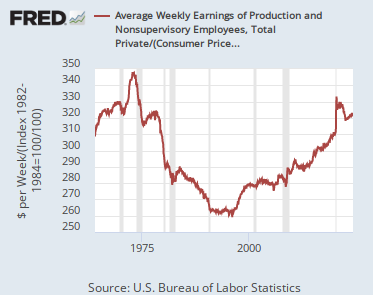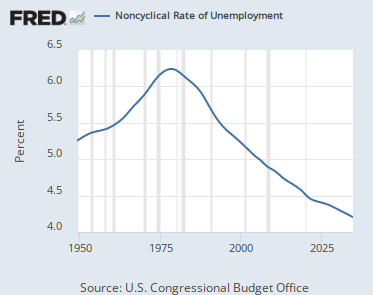- My Forums
- Tiger Rant
- LSU Recruiting
- SEC Rant
- Saints Talk
- Pelicans Talk
- More Sports Board
- Fantasy Sports
- Golf Board
- Soccer Board
- O-T Lounge
- Tech Board
- Home/Garden Board
- Outdoor Board
- Health/Fitness Board
- Movie/TV Board
- Book Board
- Music Board
- Political Talk
- Money Talk
- Fark Board
- Gaming Board
- Travel Board
- Food/Drink Board
- Ticket Exchange
- TD Help Board
Customize My Forums- View All Forums
- Show Left Links
- Topic Sort Options
- Trending Topics
- Recent Topics
- Active Topics
Started By
Message
re: 36th anniversary of Ronald Reagan firing all the air traffic controllers
Posted on 8/7/17 at 8:34 am to WhiskeyPapa
Posted on 8/7/17 at 8:34 am to WhiskeyPapa
OCTOBER 9, 2014
For most workers, real wages have barely budged for decades
Following the better-than-expected September jobs report, several economic analyses have pointed out the continuing lack of meaningful wage growth, even as tens of thousands of people head back to work. Economic theory, after all, predicts that as labor markets tighten, employers will offer higher wages to entice workers their way.
But a look at five decades’ worth of government wage data suggests that the better question might be, why should now be any different? For most U.S. workers, real wages — that is, after inflation is taken into account — have been flat or even falling for decades, regardless of whether the economy has been adding or subtracting jobs.
Cash money isn’t the only way workers are compensated, of course — health insurance, retirement-account contributions, education and transit subsidies and other benefits all can be part of the package. But wages and salaries are the biggest (about 70%, according to the Bureau of Labor Statistics) and most visible component of employee compensation.
According to the BLS, the average hourly wage for non-management private-sector workers last month was $20.67, unchanged from August and 2.3% above the average wage a year earlier. That’s not much, especially when compared with the pre-Great Recession years of 2006 and 2007, when the average hourly wage often increased by around 4% year-over-year. (During the high-inflation years of the 1970s and early 1980s, average wages commonly jumped 8%, 9% or even more year-over-year.)
But after adjusting for inflation, today’s average hourly wage has just about the same purchasing power as it did in 1979, following a long slide in the 1980s and early 1990s and bumpy, inconsistent growth since then. In fact, in real terms the average wage peaked more than 40 years ago: The $4.03-an-hour rate recorded in January 1973 has the same purchasing power as $22.41 would today."
LINK
Reagan might be the -worst- president in U.S. History, not one of the best.
Now I get that many, many of the people who post here have little or no personal recollection of Reagan. But the record is very clear. He started this nation on the road to decline.
For most workers, real wages have barely budged for decades
Following the better-than-expected September jobs report, several economic analyses have pointed out the continuing lack of meaningful wage growth, even as tens of thousands of people head back to work. Economic theory, after all, predicts that as labor markets tighten, employers will offer higher wages to entice workers their way.
But a look at five decades’ worth of government wage data suggests that the better question might be, why should now be any different? For most U.S. workers, real wages — that is, after inflation is taken into account — have been flat or even falling for decades, regardless of whether the economy has been adding or subtracting jobs.
Cash money isn’t the only way workers are compensated, of course — health insurance, retirement-account contributions, education and transit subsidies and other benefits all can be part of the package. But wages and salaries are the biggest (about 70%, according to the Bureau of Labor Statistics) and most visible component of employee compensation.
According to the BLS, the average hourly wage for non-management private-sector workers last month was $20.67, unchanged from August and 2.3% above the average wage a year earlier. That’s not much, especially when compared with the pre-Great Recession years of 2006 and 2007, when the average hourly wage often increased by around 4% year-over-year. (During the high-inflation years of the 1970s and early 1980s, average wages commonly jumped 8%, 9% or even more year-over-year.)
But after adjusting for inflation, today’s average hourly wage has just about the same purchasing power as it did in 1979, following a long slide in the 1980s and early 1990s and bumpy, inconsistent growth since then. In fact, in real terms the average wage peaked more than 40 years ago: The $4.03-an-hour rate recorded in January 1973 has the same purchasing power as $22.41 would today."
LINK
Reagan might be the -worst- president in U.S. History, not one of the best.
Now I get that many, many of the people who post here have little or no personal recollection of Reagan. But the record is very clear. He started this nation on the road to decline.
Posted on 8/7/17 at 9:29 am to WhiskeyPapa
quote:
But after adjusting for inflation, today’s average hourly wage has just about the same purchasing power as it did in 1979, following a long slide in the 1980s and early 1990s and bumpy, inconsistent growth since then. In fact, in real terms the average wage peaked more than 40 years ago: The $4.03-an-hour rate recorded in January 1973 has the same purchasing power as $22.41 would today."
This is terrible reporting from the point of view of explaining economics. Real wages/earnings represent production. With unions being highly prevalent in the 1970s and creating market distortions, a higher real wage would be natural, due to bargaining power. Yet, Regan fighting unions--among other policies--led to a marked decrease in the natural unemployment rate. And isn't that what is really being argued here--long-term effects?
Look at the real wages graph below. Are real wages falling during this time? Yes. But why are they falling. Wages are supposedly sticky or rigid, which makes us wonder how a real wage can fall. It's likely due to the decrease in union membership (from 20.1% at the start of his tenure to 12.3% by the end of his tenure.)

Also, during his tenure, RGDP grew by about 34%. You don't invoke high levels of RGDP growth by increasing nominal wages, nor do you do it by restricting labor markets--as unions would do. The reduction in unions along with greater capital flows increased production.
Lastly, and to add to the above, notice what happened to the natural rate of unemployment. Since the 80s, it has been sharply reduced. You likely don't get that kind of reduction with more unionization. In fact, you'd be hard pressed to get it as unions restrict labor markets. And that's the whole point. As labor markets loosened, more people were able to access work, more production ensued and the great prosperity of the 90s happened. Arguing that real wages (when adjusting for inflation) are stagnant ignores the long run and the whole concept of money neutrality.

Posted on 8/8/17 at 6:24 am to WhiskeyPapa
quote:
Now I get that many, many of the people who post here have little or no personal recollection of Reagan. But the record is very clear. He started this nation on the road to decline.
I take it you have no recollection of the 70s...
Posted on 8/8/17 at 6:38 am to WhiskeyPapa
A massive wall of bullshite is still bullshite.
Popular
Back to top
 3
3





